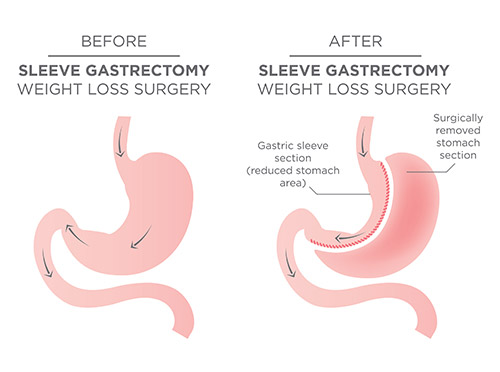Gastric Sleeve Miami
Weight Loss Solution: Gastric Sleeve
If you are severely overweight and have been unsuccessful at dropping the pounds even after trying healthy diets and exercise alone, you should learn more about a procedure known as Gastric Sleeve surgery. Also known as a sleeve gastrectomy, this procedure yields impressive results without as many complications or ongoing maintenance as a lap band.
Learning all the details about a Gastric Sleeve in Miami is the first step in determining whether this safe and popular procedure is right for you.
Request Consultation
Our bariatric surgery packages include:
- Surgeon Fees.
- Anesthesia.
- Pathology if it is required.
- 2-day hospital stay.
- Initial Virtual consultation.
- Initial in-office consultation (after surgery is booked).
- Prior Psychological evaluation.
- Nutritional clearance before surgery.
- Up to 3 follow-up visits with a nutritionist after surgery.
- 1 year of follow-up visits.
What is Gastric Sleeve surgery?
Performed laparoscopically, gastric sleeve surgery involves your surgeon making a number of small incisions in your upper abdomen. The majority of the left portion of your stomach will be removed, with the remainder shaped into a narrow tube or sleeve through which food can empty into your small intestine just as it has always done. Because of this new restriction, you will require less food to feel full and will subsequently find it easier to lose weight and keep it off.
Ideal candidates for sleeve gastrectomy
No procedure is right for everyone, and a Gastric Sleeve in Miami is no exception. The ideal candidate for the operation will:
- Have a body mass index (BMI) over 40. Patients with BMIs of 35 or above may also be candidates if they have serious obesity-related health conditions such as high blood pressure, type II diabetes, sleep apnea or heart disease.
- Have a documented history of being unsuccessful at losing weight via other methods such as lifestyle and exercise changes and eating plans.
Gastric Sleeve Before & After



Advantages of Gastric Sleeve
On January 1, 2019, U.S. health insurance giant United Healthcare was the first to add gastric sleeve to their list of approved weight loss surgeries. Soon, all of their competitors followed suit due to the many benefits patients were seeing after receiving this procedure. The advantages include:
- Loss of up to 80 percent of their excessive weight.
- Reduced feelings of hunger.
- Increased satiety.
- Enhanced quality of life due to higher self-esteem and reduced depression.
- Improved clinical laboratory results and overall health, including with lipid/cholesterol conditions and lower triglyceride counts.
- Although the stomach is smaller, patients can still tolerate most foods. They just need to be eaten in smaller amounts.
- Can be revised into a traditional Roux-en-Y bypass if desired.
- Less acid secretion, lowering the chances of an ulcer.
- Due to the fact that the intestine is intact, there is less chance of blockages, osteoporosis, anemia or nutrient deficiencies.
- No foreign bodies are added during surgery.
Why Dr. Sosa?
Even though gastric sleeve is not nearly as invasive as a traditional bypass, it is just as important that you entrust your care before, during and after the operation to the best surgeon and medical team. They should be highly knowledgeable and experienced with gastric sleeve and other bariatric procedures. Dr. Jorge L. Sosa, M.D. is South Florida’s preeminent gastric sleeve surgeon, having successfully transformed the lives of over 8,000 patients throughout the past 20 years.
Although Dr. Sosa is an acclaimed author of book chapters and articles and regularly appears in the South Florida media, his patients remain his highest priority. When you speak with him and his team, you will be treated as a unique individual with your own specific goals and objectives. No question is too big or too small, with your health, comfort and safety being the team’s highest priorities.
Your initial weight loss consultation
During your consultation, you will have ample opportunity to learn all about gastric sleeve surgery and to ask all the questions that may be occupying your mind. It’s also a time when Dr. Sosa and his team can gather details about you in order to determine whether this type of procedure is right for you. To that end, you will be asked to detail your health history, including what you have done in the past to try to lose weight.
We will also inquire about lifestyle choices such as alcohol, substance and tobacco use as well as your mental health history. Only then will we obtain a complete picture and thus be able to determine if gastric sleeve surgery is right for you. If it is, you will be able to talk with our friendly staff about next steps, including setting your surgical appointment and making financial and insurance arrangements.
Preparing for your Gastric Sleeve surgery
There are several steps you will be asked to take before the day of your actual gastric sleeve procedure. These will include some or all of the following:
- Enrolling in a bariatric surgery education program where you will learn about preparing for and recovering from your operation as well as the ongoing lifestyle changes you should expect going forward.
- Psychological evaluation.
- Nutritional counseling.
- Physical examinations and tests, possibly including upper endoscopy or imaging studies of your stomach.
- Bloodwork.
- Cessation of smoking several months before surgery.
- Requirement to lose some weight to reduce the likelihood of surgical complications.
- Stop taking aspirin and other medications that thin your blood several days before surgery.

Gastric Sleeve Surgery: How it Works?
- Before your operation begins, you will be given general anesthesia that will put you fully to sleep.
- Using laparoscopy, the doctor will make several small incisions in your upper abdomen.
- The surgeon will insert a laparoscope and surgical tools into the incisions.
- A sizing tube will be fed down your throat and into your stomach.
- Using a laparoscopic stapler, the surgeon will divide your stomach, leaving a narrow tube or sleeve.
- The remainder of your stomach will be removed through your incision.
- Tests may be run to search for leaks before completing the procedure.
- Using staples or sutures, all incisions will be closed, and you will be taken to the recovery suite.
How is Gastric Sleeve recovery like?
Most patients stay in the hospital overnight and go home the next day after gastric sleeve surgery. Your doctor will give you instructions specific to your case, but most people are on a liquid diet for a week or two after the operation. Then, in accordance with your surgical team’s recommendations, you will begin to transition to regular foods: liquids, pureed foods, soft foods, and finally to standard meals. It is vital that each of your meals is very small and that you chew every bite thoroughly.
Additionally, your smaller stomach means that your food intake will always be less than it once was. For some people, the result is that they begin to have trouble getting enough vitamins and minerals. Consequently, you may need to take vitamin and nutrient supplements long-term. For at least the first year, you will also be required to have blood tests to check calcium, glucose, vitamin D, and other levels.
Finally, you will need to make permanent modifications in your eating regimen and lifestyle to ensure that you keep the weight off and continue to benefit from the surgery.
Risks of the sleeve gastrectomy procedure
After any surgical procedure, you are at a higher risk for bleeding, blood clots, infection, and anesthesia-related reactions. Other side effects specific to gastric sleeve include problems absorbing nutrients, a narrowing of the stomach sleeve, and heartburn or reflux.+
Additionally, you may experience other problems based on underlying health conditions. That being said, gastric sleeve is considered to be very safe and highly effective, particularly for patients who receive care from a competent and experienced medical team.
Cost of Gastric Sleeve Miami
Many factors combine to determine what you will pay for a gastric sleeve procedure in Miami. These include hospital, anesthesia, operating room and physician costs, the exact type of operation you will be having, and any additional complications that may arise. In general, however, you can expect your operation to cost anywhere between $10,800 and $29,600.
Contact us and book your bariatric surgery today
Do you want increased mobility, higher self-esteem, better overall health and a longer life? Being severely overweight can deprive you of the rich, active life you deserve. Don’t wait another day to begin making the changes that can lead to your vibrant, healthy future. Call the Moon Gastric Sleeve Center today, and our friendly staff will be happy to schedule a free, no-obligation consultation with our medical team.
Gastric Sleeve Miami FAQS
What can I do If the gastric Sleeve doesn't work?
In the event that you are unhappy with your gastric sleeve procedure, your first step should be to call your surgeon. There are steps that can be taken to revise your sleeve if your stomach becomes stretched or if you find that you are regaining the weight you lost.
What changes can I expect in my diet before and after sleeve surgery?
How well the operation works for you will depend largely on your eating habits before and after surgery:
- Before surgery, you will be on a low-carbohydrate diet. You should eliminate refined sugars and increase protein intake to 60 or more grams per day. Try to eat only healthy fats.
- Two to three days pre-op, you will go on a liquid diet as recommended by your doctor.
- Week 1 after surgery: clear liquids.
- Week 2: the addition of thicker liquids like apple sauce, Greek yogurt, protein shakes, puddings, etc.
- Week 3: soft and pureed foods like cottage cheese, eggs, fish, beans, and cooked vegetables.
- Week 4: solid foods. You should still avoid whole dairy products, nuts, seeds, fried foods, candy, bread, pasta, and fibrous vegetables. In time, you can begin to re-introduce some of these restricted items, but only in small quantities. The focus should remain on lean proteins, healthy fats, and complex carbohydrates. Chew slowly and thoroughly, and stop eating as soon as you feel full.
Is gastric sleeve surgery permanent?
In one respect, yes. This is because the part of your stomach that was removed can never be put back. However, your doctor can make repairs or revisions if concerns arise months or years after your operation.
How long will I stay at the hospital after the gastric sleeve operation?
Most patients go home the next day. If your case is more complex or complications occur, you may be there for longer.
Will I need to take supplements for a lifetime?
That depends on your body and its ability to absorb vitamins and other nutrients. You will take blood tests regularly to ensure that your body is getting everything it needs and will be subscribed supplements accordingly.
Is a gastric sleeve covered by insurance?
Yes. But keep in mind that you may need to present substantial documentation before your procedure is approved.
How long after gastric sleeve can I have sex?
Some people can begin to have intercourse again one week after their surgery, while others may need to wait two or three weeks. Listen to your body’s cues, and ask your doctor if you have specific questions.
How long will I be off work after gastric sleeve surgery?
Depending on the degree of strenuous activity in your job, you may need to wait three or four weeks after surgery before you can go back to the office.
